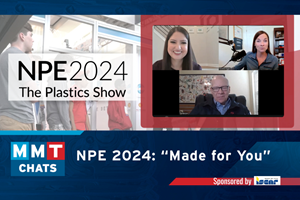2000 Asia Trade Mission Follow-up: Lessons Learned
After doing their homework overseas, moldmakers candidly discuss the impact that last year's trade mission has had on their businesses a year later.
Last year about a dozen moldmakers hopped on a plane overseas to see for themselves why some of their business was going to foreign competitors and to explore their own options. Sponsored by the Society for the Plastics Industry (Washington, D.C.) and led by Glenn Starkey, president of Progressive Components (Wauconda, IL) - a supplier of mold components, mold bases and hot runner systems - and Jim Meinert, director of international marketing for Snider Mold (Mequon, WI), - which builds large compression, injection, RIM and structural foam molds - the colleagues traveled to Hong Kong, Singapore and China. After touring moldmaking facilities, meeting with fellow moldmakers for question-and-answer sessions and attending briefings by industry professionals, local trade associations and U.S. government officials, the American moldmakers returned home and applied what they had learned to their own businesses so that they could continue to stay competitive and thrive in a cutthroat market.
Today, they are eager to share what they have learned and how it affects the way they currently conduct business. Many of them look forward to the possibility of another trade mission to the U.S./Mexico border later this year.
Increasing Awareness
For Rick Finnie, president of M.R. Mold and Engineering Corp. (Brea, CA) - a manufacturer of rubber injection, liquid silicone injection and plastic injection molds for the medical, consumer electronics, commercial and computer equipment industries - it's been more of a change in outlook. "We are certainly aware of our competition - what their strong points and weaknesses are," Finnie states. "We are now wiser - when we quote on jobs we try to sharpen our pencil a little bit more and automate as much as possible as we cannot compete on labor. We realize that we have some viable competition over there and we can't sit over here and act like nothing's wrong.
"To me, it also was a fact-finding mission - we had heard different horror stories and stereotypes about the toolrooms over there," he continues. "For example, I heard that there were toolrooms over there with dirt floors and antiquated machinery, but when I saw the shops I realized that these guys were not a bunch of amateurs."
In agreement is Don Blue, vice president of engineering at Steinwall, Inc. (Minneapolis, MN) - a custom thermoplastic injection molding/moldmaking company. "The trade mission really helped de-mystify China toolmaking for me," he comments. "As a result, I see it as an optional resource that can be utilized under the right circumstances. Not all jobs are a good fit. Understanding a supplier's capabilities is important regardless of where they are. Making sure that the customer understands the risk also is important. The net effect is that we can offer offshore tooling as another option and entertain some programs that might otherwise not be available."
The same holds true for Roger Klouda, president of Cedar Rapids, IA-based MSI Mold Builders, which focuses on medium to large injection and structural foam molds for a number of industries - including computer, business machine, appliance, material handling and medical. "For me, the trade mission confirmed that the strategy we were taking with regards to leadtimes and how our work flows through the organization was in the right direction," he states. "It reinforced for us the need for speed and nimbleness - it's not just a need, it's mission critical. Our job is to meet our customer's needs and figure out how we can do the job, not to say that we can't do it. There is always somebody out there that is going to be able to do it and we want that to be us."
Ron Pleasant, president of Kenton, OH-based Pleasant Precision, Inc. - a moldmaker and manufacturer of Round Mate systems - also altered his views and learned a tremendous amount from his peers' reactions to the moldmaking shops overseas. "It allowed me to have a better understanding of the climate over there and the realization that moldmaking doesn't stop at the east and west borders of the United States," he comments. "It changed my focus on a number of things. We need to have niches here in the United States and continue to exercise with new customers. We need to market better as moldmakers and in order for use to continue to do well with our niches, we need to be able to market those niches with new people - not just be satisfied with the people that we have. We are spending a lot more time determining what is of value to our regular and new customers - and working hard to deliver that value on a continual basis."
The camaraderie between the trade mission attendees also was a bonus for Glen Shrigley, general manager for the plastic injection tooling division of Trend Technologies (San Jose, CA), a tooling provider that specializes in computer enclosure parts as well as automotive and consumer products. "It was very interesting to meet and talk to other shop owners," he recalls. "We have all kept in contact ever since the trip. We run into each other at trade shows and even had a trade mission reunion at a recent trade show."
Shrigley made some physical changes to the shop as well. "We bought some new machinery and I've implemented a lot of new systems within the shop," Shrigley states. "It gave me the ability to come back and show my guys what the competition was really like. Before it was all hearsay. People were afraid of them but didn't really understand what they were afraid of. By going there, taking pictures and experiencing everything firsthand, I was able to take that back and make changes within my own shop environment that would make us better and more prepared to compete with them - and become better at what we do in the process. It makes you stand back and take a look at what you are good at, and see in which direction you want to go.
"One thing that I know now is not to compete with a Chinese moldmaker on certain jobs - their labor is cheaper," Shrigley continues. "So what we have done is focus on the work that we are really good at - complex, contoured parting lines that make up our niche work. By doing that, we are not competing with them on a regular basis."
As a result of the trade mission, Shrigley also was able to increase his capital budget. "I was able to go to my superiors and explain what was going on over there and how we needed to match their equipment capabilities, and I received more money to spend on equipment," he states.
Also implementing changes on the shop floor is Peter McGillivray, president of Dynamic Engineering (Minneapolis, MN) - which designs and builds molds for the medical, consumer, electronics and telecommunications industries. "We continue to make improvements in our processes aimed at reducing our labor content in order to reduce cost and delivery times," he says. "We have added high-speed machining to cut as much cavity detail as possible directly into hardened tool steel. And we installed our first manufacturing cell in our EDM department that enables us to run two machines around the clock, seven days a week. In the near future, additional robotic cells will be added to other areas of our production process."
Progressive's Starkey keeps in regular contact with everyone who attended, noting that ". . . nobody returned from the trade mission and put a 'For Sale' sign in front of their shop; and no one felt that they should throw in the towel or turn over all of their mold work to Asia. What the attendees did do is return with knowledge of the competitive waters, and a sense of urgency to position their companies to be growing, not just surviving. I've seen a lot of capacity increased at these companies, and they are generally exceptionally busy in what has been a down year."
South of the Border
Given the success of last year's mission, it's no surprise that - once again - Progressive Components' Starkey and Snider Mold's Meinert are planning a sojourn to the U.S./Mexican border in conjunction with SPI. The mission's tentative dates are December 2-5 and will include plant tours, meetings with local businesses and government contacts, then a wrap-up session.
"The last trip focused on competitive awareness and action required back home," Starkey states, "but the upcoming trade mission to Reynosa and McCallen will be for exploring the opportunities and challenges to selling to and servicing the multinationals located on the border."
M.R. Mold and Engineering Corp.'s Finnie would certainly like to fact find again. "I do see the trips as being completely different," he states. "Going over to China, I didn't really have any hopes of selling a mold to China - and I don't think that I'm going to bother trying. Unless I was trying to make a very unique type of mold, they don't need my services. With Mexico, I do have a chance to sell my molds and I plan on exploring those possibilities."
MSI Moldbuilders' Klouda also looks forward to attending another trade mission. "We are a different organization than we were three years ago, but that's really been customer-driven. The big thing with China was just seeing what the competition was doing and finding a way to beat them, and I think that we are doing a hell of a job with it. We plan on continuing down that road."
Dynamic Engineering's McGillivray also is signing up. "The last trip to Asia was a valuable way to assess our Asian competitors and it became a vehicle for change within our company," he states. "I believe that the mission to Mexico will add even more knowledge and opportunities to improve - and possibly expand - our market."
Related Content
The Critical Role of Management Representatives in ISO 9001
In ISO 9001 quality management systems, the Management Representative (MR) plays a crucial role. While the 2015 version of ISO 9001 no longer mandates this position, having a trusted management member serve as an MR remains vital for streamlining operations and maintaining quality standards.
Read MoreMMT Chats: A More Modern NPE “Made for You”
The Plastics Industry Association is making NPE 2024 a “can’t miss”’ experience with more of everything – education, exhibitors and networking! The PLASTICS Industry Association Chief Operating Officer Glenn Anderson and Director of Trade Show Marketing Damaris Piraino share what’s in store for attendees of next year’s May 6-10, 2024 in Orlando, Florida.
Read MoreTreatment and Disposal of Used Metalworking Fluids
With greater emphasis on fluid longevity and fluid recycling, it is important to remember that water-based metalworking fluids are “consumable” and have a finite life.
Read MoreCertified Quality Management for Plastics Professionals – Materials to Tooling to Recycling
Why is certification of a shop’s quality management system to ISO 9001, AS9100, IATF 16949 or ISO 13485 so special? What does the certification signify? And what supports the paper behind the framed certificate?
Read MoreRead Next
Reasons to Use Fiber Lasers for Mold Cleaning
Fiber lasers offer a simplicity, speed, control and portability, minimizing mold cleaning risks.
Read MoreHow to Use Continuing Education to Remain Competitive in Moldmaking
Continued training helps moldmakers make tooling decisions and properly use the latest cutting tool to efficiently machine high-quality molds.
Read MoreHow to Use Strategic Planning Tools, Data to Manage the Human Side of Business
Q&A with Marion Wells, MMT EAB member and founder of Human Asset Management.
Read More













.jpg;maxWidth=300;quality=90)







.jpg;maxWidth=970;quality=90)